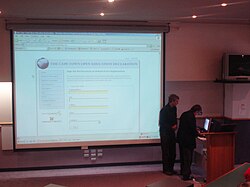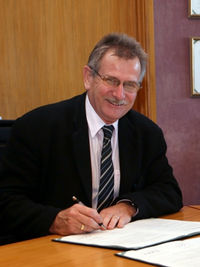About
An open education message from our Chief Executive
I am pleased for New Zealand and Otago Polytechnic to be sharing a leadership role with open content collaborators around the world in promoting Open Education Resources (OER). If leadership is about getting results then the role of leaders is to develop the right strategies to get those results[1]. We are proud to host the international head office of the OER Foundation. In this regard, the OER Foundation is a leader with a difference: collaborating openly with education institutions and educators around the world to develop the strategies for getting open education right.OER is the means by which education at all levels can be more accessible, more affordable and more efficient. For individuals, OER can facilitate access to the world's best quality learning materials while at the same time demonstrating huge potential for lowering the cost of study through open textbook initiatives. Using OER approaches, institutions can lower cost and save time required to produce high quality courses with untapped potential to diversify curriculum offerings especially for low enrolment courses in a cost-effective way. Governments and whole education systems can improve the return on tax payer dollars by providing the systemic incentives to ensure release of education materials under open content licenses. Why should tax payers need to “pay twice” for the education resources funded centrally through government grants to our national institutions?
OER is about sharing and collaboration and to this end we have much untapped potential. It is time for teachers, lecturers and trainers to stop reinventing “rounder” wheels and doing everything anew for themselves while today's technology combined with open licensing affords the power of shared programmes, course and resource development. I see this as a major challenge for teaching institutions today, that is, to encourage and facilitate our staff to work collaboratively, not only for the common good, but in their own long-term interests.
OER is a sustainable and renewable resource and the OER Foundation is a smart way for individuals and institutions around the globe to share in these benefits.
Our OER journey and commitment to sustainable education practice

Education for sustainability incorporates the way we teach and the resources we consume in the provision of high quality learning experiences. As OER is a sustainable and renewable resource we have made an organisation-wide commitment to open content through the adoption of a default Creative Commons Attribution Policy reflecting an intellectual property approach for the digital age[2]. This has resulted in a win-win solution for all involved. Creators of content retain their intellectual property rights while contributing to the sustainability of the Polytechnic and education institutions around the world by granting permissions to reuse adapt and modify educational materials for the social good of education.
In 2005 Otago Polytechnic planted the seeds for progress on the open education front and commenced discussions with students, staff and external stakeholders concerning ownership of intellectual property rights. On 17 August 2007, the new IP policy was formerly approved and adopted. In May 2008, Otago Polytechnic formerly signed the Cape Town Open Education Declaration. The Polytechnic recognises that we cannot nurture the development of a global and sustainable OER ecosystem alone and this is best achieved through open partnerships and collaboration. In November 2008, Otago Polytechnic's Council approved the establishment of an independent non-profit entity to assist organisations around the world in sharing the benefits of open education based on a philosophy of open philanthropy. The OER Foundation Limited was registered![]() as a non-profit company in April 2009 under the New Zealand Companies Act of 1993. The OER Foundation provides leadership, international networking and support for educators and educational institutions to achieve their objectives through Open Education.
as a non-profit company in April 2009 under the New Zealand Companies Act of 1993. The OER Foundation provides leadership, international networking and support for educators and educational institutions to achieve their objectives through Open Education.
We extend an open invitation to all education institutions to join the OER Foundation in co-designing and collaborating on strategic and sustainable futures for education today.
References
- Jump up ↑ Jeffrey Gandz (2005) The leadership role. Ivey Business Journal. Available online: http://www.ibj.ca/view_article.asp?intArticle_ID=532.
- Jump up ↑ http://wiki.creativecommons.org/Case_Studies/Otago_Polytechnic


